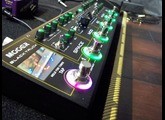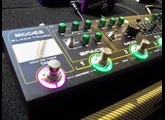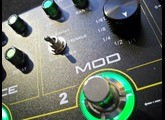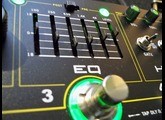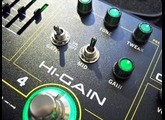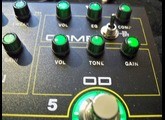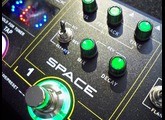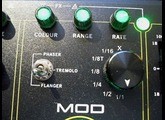« Great Tone and Packed with Features »
Published on 03/06/19 at 14:55
Best value:
Excellent
Audience:
Anyone
SOUND:
The Black Truck offers plenty of tone sculpting possibilities. The Hi-Gain component, for example, allows you to either hump or scoop the midrange, besides there being a Tone control and a Tweak control (that shapes and adjusts the lower frequencies, viz., tighter or heavier). The Hi-Gain channel then can be affected by the Overdrive module, which has a Tone control, and if you decide to use the Compressor feature, then it, too, has a Tone/EQ feature. And if that wasn’t enough, there is a five-band Graphic EQ module that you can apply pre- or post- OD/Gain. And so, imagine having the Hi-Gain channel set where you want, then in the middle of a song you step on the OD for added gain, but also a different tone, and then further in the song you apply a different EQ (and pre- vs. post- will give different results). And then there’s the Modulation module that allows you to add Tremolo, a Phaser or Flanger, any of which has a ‘color’ and ‘range’ control for even more tone shaping. And to top it off is a digital Delay/Reverb (you can use either or both in the mix). Now, when all is said and done, musicians are most interested in the sound and quality of the distortion or the Hi-Gain module. It is an analog circuit, and so it sounds pretty good, but the best way to describe it is a very modern and grainy tone. You definitely can get some hard rock sounds from it, but it certainly feels at home in a metal setting. You can go mono or stereo out, and if you use the headphone jack as your mono out there is a built-in cab-sim so that you can go direct to a mixing board or your DAW. The accompanying demo video showcases the Black Truck in a number of settings and with various parameters (although it just scratches the surface in terms of what is possible).
OVERALL IMPRESSION:
Pricing may vary, but currently the Black Truck is available in Canada for $352. Designed for hard rock and metal musicians, there are no menus to scroll through and it functions with actual knobs and switches. It is an awesome buy and for several reasons. First, it’s a great fly-rig for gigging musicians who want to keep it light with a lot of effect choices and easy hookup to an amp or PA system. Second, home recording musicians will find the analog quality with 24-bit digital ‘space’ (delay/reverb) excellent for direct DAW purposes (besides the headphone jack for quiet practice or for mono out with a cab-sim) and realistic tone. Third, those who may be on a budget, you will get a lot of ‘gear’ in a single unit that otherwise would cost 2-3 times as much if the modules were purchased separately. You get a Compressor, Overdrive, Hi-Gain, a Graphic EQ, Modulation (tremolo, phaser and flanger) and Delay/Reverb. Best yet, you don’t need a pedalboard to contain or accommodate various pedals as they integrate into one simple unit. Each component or module of the Black Truck has a lot of flexibility, including volume, tone, gain controls, depth, tap tempo, noise gate, guitar tuner, stereo output and a lot more. Factor in the FX Loop, which you can add to your amp, you also can plug in additional preamps (Mooer has 20 mini-preamps to date) to increase your tonal palate. It does not come with a power supply and does require a minimum 9VDC 1000mA adapter (Mooer has a 2A adapter for $29.95 Canadian), but it does come with a protective carry case.
GENERAL USE:
There is a lot of flexibility with the Black Truck, including how to hook it up straight to an amp or PA system (and whether to use it in an FX Loop or to integrate other gear in its FX Loop), and so I will provide some simple guidelines. If you want to keep the tone subdued and fairly clean, you would use only the Overdrive module on low. You can add in the Compressor if you want to boost the signal or even-out the loudness of your tone (and add a bit of sustain). Only when you want to get more edgy would you kick in the Hi-Gain, which sounds fairly meaty just at 9-o’clock, but nothing over the top. As you approach 12-noon, the Hi-Gain setting really soars, and beyond that you may want to apply the Gate (which is actually quite good and does not sap your tone or sustain). The Overdrive, Compressor and Hi-Gain components all have their own EQ or Tone controls, and so there’s plenty of tone shaping possible. The Hi-Gain also has a Mid switch to either add or scoop the mid-range frequency, as well as a Tweak knob to tighten up or fatten the low end. There is a 5-band Graphic EQ (100 HZ, 250 Hz, 1,4 kHz, 4K Hz and Level) that allows you to cut or boost accordingly, and you can apply it pre-gain or post-gain, depending on how you want to affect your tone or affect the OD/Hi-Gain elements. The Modulation module has a lot of possibilities, and includes Tremolo, Phaser and Flanger. With either of these you can control the ‘color,’ ‘range’ and ‘rate,’ thereby giving you more sweep, less/more low and high end to the effect, the degree of mix, etc. This module also includes a Rhythm Knob so that you can adjust the sub-division or tap tempo division of the modulation, such as a 1:1 ratio (very long and sweeping effect) half, quarter, eighth notes, triplets, sixteenth (for very rapid pulsating) or random. The ‘X’ setting produces random sub-divisions if you’re looking for something more off the wall and unusual. The Delay/Reverb module is digital and very clean. I like this module since you do not have to choose between Delay or Reverb (although you can), but can mix the two. Both elements have the usual controls of mix, and how much decay/feedback/time you want. As with any multi-effects unit there are dozens of possible combinations, and so operational instructions beyond this point is moot.
Hook-ups need to be considered as well. There is an FX Loop that can be integrated into an amp, or you can bring in other effects (sandwiched between the OD/Hi-Gain and the other modules). This is a great place to add other preamps to diversify the Black Truck’s tones. There is a Stereo Out (although you can choose mono), as well as a headphone out that you can use as your mono out as it also includes Cab Simulation. The Tap Tempo remains active (the light around the footswitch pulses to its bpm), and so at any time you can tap in your tempo and it will affect the Delay/Reverb and Modulation modules simultaneously (or you can affect only one of the modules with a different switch operation). To access the guitar tuner, hold the Tap Tempo down for a few seconds, tune up, and then step on the Tap Tempo to return to the effects. You also can save 5 presets. To do so you switch on or off any Module you want (or don’t want) and then hold down one of the footswitches (1-5) as to where you want to save that preset. Keep in mind that the preset only saves what Modules are on or off and not where the knobs/toggle switches are set. To flip between Live mode and Preset mode you step on the Tap Tempo and footswitch #1 simultaneously (thus putting you in Preset mode) and then step on the desired preset (numbers 1-5).
OTHER DETAILS:
Measuring 370 mm (D) X 96 mm (W) X 51 mm (H) or 14.5 x 3.8 x 2 inches and weighs 1.23Kg (2.7 pounds), including the weight of the carry case, the Black Truck is highly portable for gigging musicians, but also a space saver for those wanting a lot of gear in a small package (and with footswitch accessibility). The six footswitches are ‘soft’ switches that do not produce any noise (clicking) when engaged. Any knobs or toggle switches located near any of the footswitches are set lower and are safe from any stomping feet. LED lights are built into various knobs and the LEDs (status lights) associated with the footswitches are located around the base of each switch. All knobs and toggle switches feel solid during operation, and the knobs’ pots feel smooth and of quality construction when turned. All mini-knobs for each Module (e.g., volume, tone and EQ of the Overdrive) have built-in lights so that you can see the settings in a dark room, which partly is a safety factor (you can see where the Black Truck is located), but certainly convenient if needing to change any setting. All inputs and outputs are located in the back, including the power source, headphone jack, etc. Battery operation is not supported and you do require a minimum 9VDC 1000mA power supply, and so be certain to have enough juice flowing or you could damage the unit. Mooer has an optional 2A power supply (PDNW-9V2A-MP). The padded carry case with handle is a nice bonus, for easy transport, but also to protect the Black Truck en route to a gig. In terms of size, think of a flute case.
The Black Truck offers plenty of tone sculpting possibilities. The Hi-Gain component, for example, allows you to either hump or scoop the midrange, besides there being a Tone control and a Tweak control (that shapes and adjusts the lower frequencies, viz., tighter or heavier). The Hi-Gain channel then can be affected by the Overdrive module, which has a Tone control, and if you decide to use the Compressor feature, then it, too, has a Tone/EQ feature. And if that wasn’t enough, there is a five-band Graphic EQ module that you can apply pre- or post- OD/Gain. And so, imagine having the Hi-Gain channel set where you want, then in the middle of a song you step on the OD for added gain, but also a different tone, and then further in the song you apply a different EQ (and pre- vs. post- will give different results). And then there’s the Modulation module that allows you to add Tremolo, a Phaser or Flanger, any of which has a ‘color’ and ‘range’ control for even more tone shaping. And to top it off is a digital Delay/Reverb (you can use either or both in the mix). Now, when all is said and done, musicians are most interested in the sound and quality of the distortion or the Hi-Gain module. It is an analog circuit, and so it sounds pretty good, but the best way to describe it is a very modern and grainy tone. You definitely can get some hard rock sounds from it, but it certainly feels at home in a metal setting. You can go mono or stereo out, and if you use the headphone jack as your mono out there is a built-in cab-sim so that you can go direct to a mixing board or your DAW. The accompanying demo video showcases the Black Truck in a number of settings and with various parameters (although it just scratches the surface in terms of what is possible).
OVERALL IMPRESSION:
Pricing may vary, but currently the Black Truck is available in Canada for $352. Designed for hard rock and metal musicians, there are no menus to scroll through and it functions with actual knobs and switches. It is an awesome buy and for several reasons. First, it’s a great fly-rig for gigging musicians who want to keep it light with a lot of effect choices and easy hookup to an amp or PA system. Second, home recording musicians will find the analog quality with 24-bit digital ‘space’ (delay/reverb) excellent for direct DAW purposes (besides the headphone jack for quiet practice or for mono out with a cab-sim) and realistic tone. Third, those who may be on a budget, you will get a lot of ‘gear’ in a single unit that otherwise would cost 2-3 times as much if the modules were purchased separately. You get a Compressor, Overdrive, Hi-Gain, a Graphic EQ, Modulation (tremolo, phaser and flanger) and Delay/Reverb. Best yet, you don’t need a pedalboard to contain or accommodate various pedals as they integrate into one simple unit. Each component or module of the Black Truck has a lot of flexibility, including volume, tone, gain controls, depth, tap tempo, noise gate, guitar tuner, stereo output and a lot more. Factor in the FX Loop, which you can add to your amp, you also can plug in additional preamps (Mooer has 20 mini-preamps to date) to increase your tonal palate. It does not come with a power supply and does require a minimum 9VDC 1000mA adapter (Mooer has a 2A adapter for $29.95 Canadian), but it does come with a protective carry case.
GENERAL USE:
There is a lot of flexibility with the Black Truck, including how to hook it up straight to an amp or PA system (and whether to use it in an FX Loop or to integrate other gear in its FX Loop), and so I will provide some simple guidelines. If you want to keep the tone subdued and fairly clean, you would use only the Overdrive module on low. You can add in the Compressor if you want to boost the signal or even-out the loudness of your tone (and add a bit of sustain). Only when you want to get more edgy would you kick in the Hi-Gain, which sounds fairly meaty just at 9-o’clock, but nothing over the top. As you approach 12-noon, the Hi-Gain setting really soars, and beyond that you may want to apply the Gate (which is actually quite good and does not sap your tone or sustain). The Overdrive, Compressor and Hi-Gain components all have their own EQ or Tone controls, and so there’s plenty of tone shaping possible. The Hi-Gain also has a Mid switch to either add or scoop the mid-range frequency, as well as a Tweak knob to tighten up or fatten the low end. There is a 5-band Graphic EQ (100 HZ, 250 Hz, 1,4 kHz, 4K Hz and Level) that allows you to cut or boost accordingly, and you can apply it pre-gain or post-gain, depending on how you want to affect your tone or affect the OD/Hi-Gain elements. The Modulation module has a lot of possibilities, and includes Tremolo, Phaser and Flanger. With either of these you can control the ‘color,’ ‘range’ and ‘rate,’ thereby giving you more sweep, less/more low and high end to the effect, the degree of mix, etc. This module also includes a Rhythm Knob so that you can adjust the sub-division or tap tempo division of the modulation, such as a 1:1 ratio (very long and sweeping effect) half, quarter, eighth notes, triplets, sixteenth (for very rapid pulsating) or random. The ‘X’ setting produces random sub-divisions if you’re looking for something more off the wall and unusual. The Delay/Reverb module is digital and very clean. I like this module since you do not have to choose between Delay or Reverb (although you can), but can mix the two. Both elements have the usual controls of mix, and how much decay/feedback/time you want. As with any multi-effects unit there are dozens of possible combinations, and so operational instructions beyond this point is moot.
Hook-ups need to be considered as well. There is an FX Loop that can be integrated into an amp, or you can bring in other effects (sandwiched between the OD/Hi-Gain and the other modules). This is a great place to add other preamps to diversify the Black Truck’s tones. There is a Stereo Out (although you can choose mono), as well as a headphone out that you can use as your mono out as it also includes Cab Simulation. The Tap Tempo remains active (the light around the footswitch pulses to its bpm), and so at any time you can tap in your tempo and it will affect the Delay/Reverb and Modulation modules simultaneously (or you can affect only one of the modules with a different switch operation). To access the guitar tuner, hold the Tap Tempo down for a few seconds, tune up, and then step on the Tap Tempo to return to the effects. You also can save 5 presets. To do so you switch on or off any Module you want (or don’t want) and then hold down one of the footswitches (1-5) as to where you want to save that preset. Keep in mind that the preset only saves what Modules are on or off and not where the knobs/toggle switches are set. To flip between Live mode and Preset mode you step on the Tap Tempo and footswitch #1 simultaneously (thus putting you in Preset mode) and then step on the desired preset (numbers 1-5).
OTHER DETAILS:
Measuring 370 mm (D) X 96 mm (W) X 51 mm (H) or 14.5 x 3.8 x 2 inches and weighs 1.23Kg (2.7 pounds), including the weight of the carry case, the Black Truck is highly portable for gigging musicians, but also a space saver for those wanting a lot of gear in a small package (and with footswitch accessibility). The six footswitches are ‘soft’ switches that do not produce any noise (clicking) when engaged. Any knobs or toggle switches located near any of the footswitches are set lower and are safe from any stomping feet. LED lights are built into various knobs and the LEDs (status lights) associated with the footswitches are located around the base of each switch. All knobs and toggle switches feel solid during operation, and the knobs’ pots feel smooth and of quality construction when turned. All mini-knobs for each Module (e.g., volume, tone and EQ of the Overdrive) have built-in lights so that you can see the settings in a dark room, which partly is a safety factor (you can see where the Black Truck is located), but certainly convenient if needing to change any setting. All inputs and outputs are located in the back, including the power source, headphone jack, etc. Battery operation is not supported and you do require a minimum 9VDC 1000mA power supply, and so be certain to have enough juice flowing or you could damage the unit. Mooer has an optional 2A power supply (PDNW-9V2A-MP). The padded carry case with handle is a nice bonus, for easy transport, but also to protect the Black Truck en route to a gig. In terms of size, think of a flute case.

